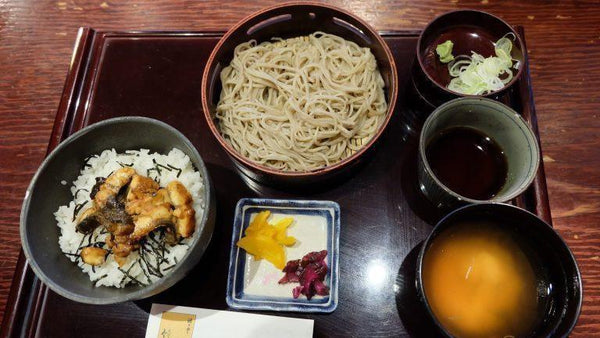
It is summer in Japan and to beat these hot and humid days that affect our personal state (the so called natsubate or summer heat fatigue) we should also change the foods we eat.
For instance, two great foods to eat during the hot Japanese summer are cold soba (buckwheat noodles) and unagi (eel). In this occasion, we went to Nagano and enjoyed a meal set with these two ingredients (see picture below).

Soba and Unagidon Meal Set
Let's explain a little bit more in detail why soba noodles and unagi (eel) are good ingredients to eat during the summer.
Cold Soba (buckwheat noodles)
Soba noodles can be enjoyed during the whole year either cold or hot, but they are specially revitalizing in the summer. With high content of nutrients and vitamins, soba noodles can help combat the summer heat fatigue. Moreover, buckwheat noodles are slow releasing carbohydrates, so when eating them energy levels are kept stable throughout the day.
Cold soba noodles are normally enjoyed dipping them into tsuyu sauce, mixed with green onion and wasabi. It is a refreshing and healthy dish as well as very easy to prepare.
Unagi (eel)
Unagi or Japanese eel is a fish very associated with the summer. Actually during the Doyo no ushi no hi (“Midsummer day of the ox”), the day which marks the peak of summer in Japan, unagi is widely consumed in the country since the Edo period (1603-1867).
In this regard, unagi is a freshwater fish that contains high levels of Omega-3 oils as well as vitamin B, components that will boost your endurance and stamina levels.
For preparing unagi, the eels are normally grilled over hot charcoal, then steamed or not and seasoned with a savoury soy-based sauce. The flavour is rich and the texture crispy on the outside but tender and succulent on inside.
The downside is that this delicacy is quite expensive in Japan but at least once in a year this classical summer food should be enjoyed!
Finally, unagi should not be confused with anago which is the word for salt water eels.


0 comments